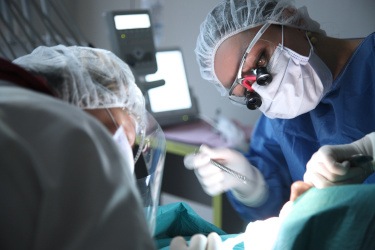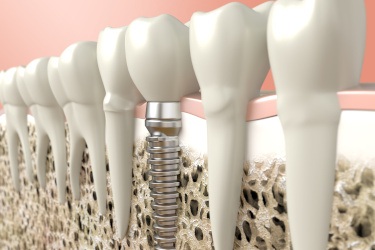Dental Implants – Dallas, TX
The Most Lifelike Tooth Replacements
 *Actual Patient
*Actual PatientIf you suffer from tooth loss, you can trust any of our office’s restorations to help. All our replacement teeth work well and deliver great results, from dentures to dental bridges. Even so, the fact is that our dental implants in Dallas are the superior way to restore your smile. Modern dentistry sees these posts as the most lifelike of all the tooth replacements. If you want to learn more about them, just keep reading or book a consultation today.
Why Choose Lake Boone Dentistry For Dental Implants?
- Partners with Local Specialists
- A Dentist with Decades of Experience
- Third-Party Financing Available
What Are Dental Implants?

In themselves, dental implants are small posts made of sturdy titanium. Dentists design and use them to replace the roots of a patient’s missing teeth.
Unlike dentures or dental bridges, dental implants have their own distinct placement method. The treating surgeon sets them directly in the jaw’s sockets instead of over the gums. This feature ensures the implant posts fuse with (and stimulate) your jawbone’s tissue, making them permanent parts of your mouth. The prosthetics can then support their abutments (i.e., metal connectors) and final restorations.
The-4-Step Dental Implants Process

Dental implants are the preferred method for replacing missing teeth because they replace the tooth roots, not just the chewing surfaces. This allows for a wide range of different benefits that you can’t experience from dentures or dental bridges. To achieve this, patients must undergo a multi-step process that spans over the course of several months. Everyone’s treatment looks a little bit different, but here are the four main steps that everyone can expect.
Initial Dental Implant Consultation

Before you undergo dental implant surgery, you’ll consult Dr. Mitchell about treatment. This talk lets him confirm your oral health and smile goals. Some patients require preliminary procedures, like gum disease treatment or bone grafting, before they are able to get dental implants. If these apply to you, we will help you to get them scheduled. Once your gums and jawbone are in good shape, we can plan the rest of your treatment. We will also go over the cost and timeline that you can expect.
Dental Implant Surgery

With Dr. Mitchell’s approval, we’ll perform your implant surgery entirely in-office to ensure quality results. The first step is to numb the area with a local anesthetic to ensure that you are comfortable throughout the procedure. We also have sedation options for additional relaxation. Then, a small incision is made into the gum tissue so the implants can placed at precise locations in the jawbone. The gums are closed, and protective caps are placed over the end of the implants to keep them safe throughout the recovery period.
Dental Implant Osseointegration & Abutment

After the surgery, your dental implants will slowly fuse with your jaw in a process called “osseointegration.” This is what makes the implants so stable and long-lasting. Healing can take anywhere from 3 to 6 months. We’ll place their abutments once this fusion process has ended. Impressions are taken so your restoration(s) can be customized at the dental lab.
Delivery of Dental Implant Restoration(s)

Once you’ve gotten your abutment(s), you’ll visit us for your final restoration a few weeks later. This item will be a dental crown, bridge, or denture, depending on your case. If everything looks and feels great, you will be free to show off your complete smile to the world!
The Benefits of Dental Implants

Since more than 500,000 dental implants are placed every year, they are rapidly becoming one of the most popular forms of tooth replacement. These titanium posts are surgically inserted directly into the jawbone where they fuse with the surrounding structure through the natural process of osseointegration, creating a sturdy hold that allows them to work and feel just like real teeth while supporting a lifelike and functional dental crown. Here are a few of the excellent benefits that allow dental implants to vastly improve the confidence, appearance, and quality of life of patients in Dallas and beyond.
Day-to-Day Benefits

Dental implants provide a variety of benefits that you might notice in your daily life, such as:
- Improved chewing ability: While dentures and dental bridges often have trouble when chewing tougher or crunchier items like steak, raw veggies, and nuts, dental implants can make short work of these foods, allowing you to enjoy a tastier and more balanced diet.
- Being easy to clean: Dental implants only require the same daily oral hygiene routine as real teeth once they have fused to the jaw, meaning that you’ll only need to keep up with brushing, flossing, and using antibacterial mouthwash. This is much more convenient than the elaborate daily cleaning rituals required by traditional restorations like dentures.
- Sitting securely in the mouth: Since dental implants are fused to the jawbone, there is no chance that they will cause embarrassment by sliding out of place during speech or meals.
- Looking just like real teeth: Once they have fully fused with the jawbone, dental implants are fitted with a lifelike restoration such as a crown or implant-secured denture that will fit seamlessly with the rest of your smile.
Health Benefits

Dental implants can also improve a patient’s oral and overall health in ways like:
- Improving diet: Since dental implants allow patients to eat anything they could with real teeth, they empower them to enjoy the varied and nutritious diet the human body needs for optimal health.
- Preventing oral infections: Since dental implants are so easy to clean, preventing oral infections like gum disease and tooth decay is a simple matter of proper oral hygiene.
- Not sliding around in the mouth: When traditional dentures fit poorly, they can slip about in the mouth, irritating the soft tissues or damaging the surrounding teeth. Since dental implants are held securely by the jawbone, they don’t cause sores or dental injuries.
- Preserving the jawbone: Dental implants give the jawbones the exercise they need to stay healthy and strong after tooth loss, preventing them from receding and pulling neighboring teeth out of alignment.
Long-Term Benefits

Dental implants also confer several important long-term benefits, including:
- A 95% success rate: Even after ten years, 95% of dental implants are still functioning, making them a sound investment in your oral health.
- A long-lasting solution: With excellent hygiene and maintenance, your dental implant may last for as long as thirty years or even a lifetime.
- Not needing expensive replacements: While traditional bridges and dentures must be replaced regularly, dental implants can last for decades, which can save the patient thousands of dollars that would be spent on new appliances.
Who Dental Implants Can Help

Whether you’re missing one tooth or many, you’ll likely benefit from dental implants. These posts can just as easily fill large smile gaps as small ones. Still, only patients with healthy gums and a dense jawbone qualify for them. Your gums and jaw need to be fairly strong to support implants once they’re placed. If their tissues are too weak, the implant posts will come loose and suffer a failure.
Missing One Tooth
One dental implant and crown is enough when you only lack one tooth. With this pair, the result should be a restored smile that can last longer than a dental bridge. Notably, placing the implant and crown won’t alter your nearby teeth. Implant posts only need to fuse with your jaw to stay secure.
Missing Multiple Teeth
When you’re missing several adjacent teeth, an implant bridge is an ideal option. This device is a fixed restoration that uses dental implants instead of crowns. For that reason, placing it doesn’t require a dentist to alter your nearby natural teeth (i.e., abutments). The treatment process won’t remove any of your existing enamel.
All that said, a partial implant denture may work better when the missing teeth aren’t adjacent.
Missing All Teeth
A full implant denture is your best bet when you’ve lost (or will soon lose) all your teeth. Once it’s placed, this appliance can restore an entire arch with just a few dental implants. That means it won’t slip or fall like a regular denture, as its implants will keep it secure. The number of posts is also minimal to ensure a less involved treatment.
Understanding the Cost of Dental Implants

Even if you want dental implants, you may hesitate due to their (potential) price. Fair enough – these posts won’t help if they exceed your budget. However, the cost of dental implants varies from patient to patient. You’ll need to consult Dr. Mitchell in person to get an exact estimate. After doing so, our team will find ways to make your treatment more affordable. We’ll even walk you through your implants’ pricing factors, payment options, etc.





